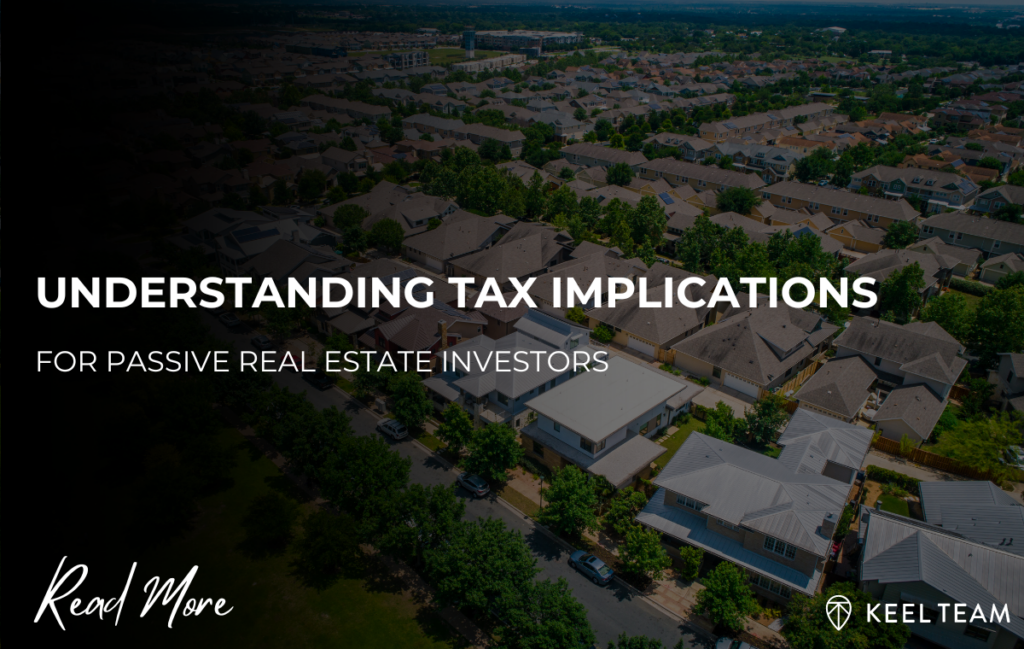Understanding Tax Implications for Passive Real Estate Investors
-
 Tristan Hunter - Investor Relations
Tristan Hunter - Investor Relations

Investing in real estate passively typically offers a range of potential benefits, from generating income to achieving long-term appreciation. However, like any investment, understanding the associated tax implications is crucial. Passive real estate investors can potentially optimize returns by leveraging various tax benefits. Yet, they must remain aware of potential liabilities. In this blog post, we’ll explore key tax considerations for passive investors to help them make informed decisions and manage their investments effectively.
Depreciation and Cost Segregation: Maximizing Tax Deductions
One significant tax advantage for passive real estate investors is the ability to claim depreciation. The IRS allows investors to deduct a portion of a property’s value each year as a depreciation expense. This deduction can substantially reduce taxable income, enabling investors to retain more of their earnings.
Beyond standard depreciation, investors can further optimize their tax situation through cost segregation. Cost segregation involves analyzing a property in detail to identify and reclassify specific components. By doing this, some elements may qualify for shorter depreciation periods. For example, lighting fixtures or landscaping might be depreciated over a shorter timeline compared to the building itself. As a result, investors can accelerate depreciation deductions, potentially reducing their taxable income even further. This strategy is particularly useful for those looking to lower their tax burden in the early years of ownership.
Navigating Passive Activity Losses (PALs): Knowing the Limits
Passive real estate investments often generate passive activity losses (PALs). These losses occur when deductible expenses, such as mortgage interest, property taxes, and maintenance costs, exceed the income generated from the property. While PALs can benefit investors by offsetting passive income, they come with certain limitations.
The IRS has specific rules governing how passive activity losses can be used. Generally, PALs can only offset other passive income; they cannot be applied to wages, salaries, or investment gains from other sources. However, exceptions exist under certain circumstances. For instance, real estate professionals who actively participate in property management may use these losses to offset non-passive income. Understanding these rules and how they apply to your situation is essential for potentially optimizing tax benefits.
Utilizing the 1031 Exchange: Deferring Capital Gains Taxes
Another valuable tax strategy for passive real estate investors is the 1031 exchange. Named after Section 1031 of the Internal Revenue Code, this exchange allows investors to defer paying capital gains taxes when selling one property and reinvesting the proceeds into another like-kind property. This deferral can be a powerful tool for preserving investment capital and building wealth over time.
To execute a 1031 exchange successfully, investors must follow strict IRS guidelines. The new property must be of equal or greater value than the one sold, and the exchange must be completed within a specific timeline. Investors must identify the replacement property within 45 days of the sale and complete the transaction within 180 days. Understanding and adhering to these rules is vital for compliance and maximizing the possible benefits of this strategy.
Download our FREE eBook! Learn the top things to consider before going into a passive mobile home park investment
– Authored by Andrew Keel

Self-Employment Tax Considerations: Assessing Your Role
For passive real estate investors, understanding self-employment taxes can sometimes be confusing. Rental income is typically considered passive and not subject to self-employment tax. However, this changes if the investor is actively involved in managing the property.
The IRS has guidelines for determining whether an investor’s participation in rental activities qualifies them as a real estate professional. If an investor meets these criteria, their rental income may be subject to self-employment tax. However, qualifying as a real estate professional can also unlock other tax advantages, such as the ability to deduct PALs against non-passive income. Therefore, it’s important for investors to assess their level of involvement in property management and consult with a tax professional to understand the potential tax implications.
State and Local Taxes: Considering Regional Differences
While federal tax considerations often take center stage, state and local taxes should not be overlooked. Tax laws and regulations can vary significantly from one jurisdiction to another, impacting the overall tax liability of a real estate investment.
For example, some states impose additional taxes on rental income or have specific requirements for reporting and paying taxes on real estate transactions. Additionally, property taxes can vary widely depending on the location. Investors should proactively understand the state and local tax landscape where their property is located. Consulting with a tax professional familiar with the specific requirements of the jurisdiction can help ensure compliance and minimize unexpected tax burdens.
Conclusion: Strategic Tax Planning for Passive Real Estate Investors
Investing in mobile home parks or other real estate passively offers numerous potential benefits. However, navigating the complex tax implications is crucial for possibly maximizing returns. Leveraging depreciation, utilizing cost segregation, and employing 1031 exchanges are some of the strategies that can help investors optimize their tax situation.
These strategies require careful planning and a thorough understanding of applicable tax rules. Engaging a qualified tax professional who specializes in real estate can provide valuable guidance, helping investors minimize their tax liabilities and maximize after-tax returns. By staying informed and proactive, passive real estate investors can make decisions that support their long-term financial goals while effectively managing the tax implications of their investments.
Learn more about mobile home park investing.
Interested in learning more about mobile home park investing? Get in touch with us today to find out more.
Disclaimer:
The information provided is for informational purposes only and is not investment advice or a guarantee of any kind. We do not guarantee profitability. Make investment decisions based on your own research and consult registered financial and legal professionals. We are not registered financial or legal professionals and do not provide personalized investment recommendations.

Tristan Hunter - Investor Relations
View The Previous or Next Post
Subscribe Below 👇





